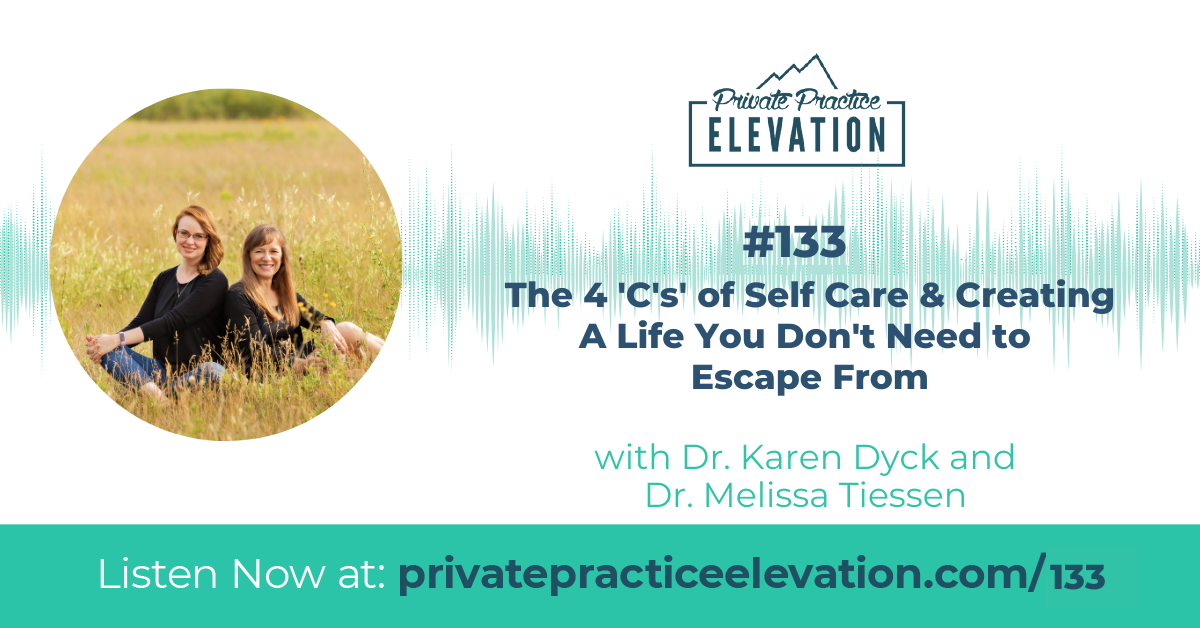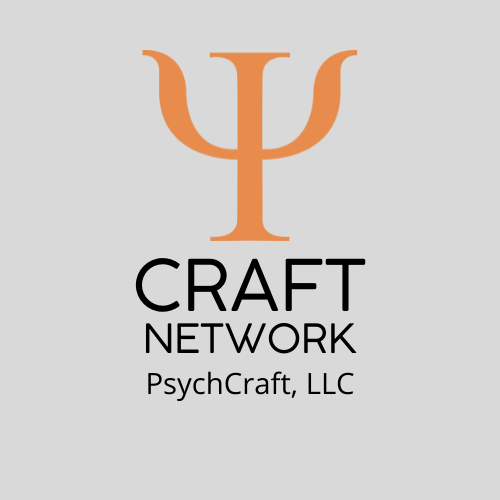Do you feel like you’re intentionally creating a life from which you don’t need to escape?
Or are you finding it incredibly difficult to create a balance between caring for others’ needs and caring for yourself?
In this episode of The Private Practice Elevation Podcast, you’re going to receive a framework that you can apply to your life so that you can embrace self-care in a way that works for you.
Let’s face it… incorporating self-care into our daily lives is hard.
It seems so counterintuitive to take time out of your day to focus on yourself, do things that bring you joy, or just slow down.
And we can often deal with feelings of guilt for putting our own needs above others.
I know I’ve struggled with this.
Today we’re speaking with Dr. Karen Dyck and Dr. Melissa Tiessen about what it means to embrace self-care and the positive impact it can have on our lives.
They’ve developed a framework, called The 4 ‘C’s”, that is going to help you identify where life has gotten off-balance and give you a road forward toward creating a life you love.
In This Episode, You’ll Learn:
- The 4 ‘C’s’ of Self-Care: Connection, Compassion, Courage, and Creativity
- How the 4 ‘C’s’ are connected and how to move between them to embrace self-care in a way that helps you thrive
- The shared challenges we all face when it comes to taking care of ourselves
- How our brains are wired in a way that actually makes self-care counterintuitive
- How the 4 ‘C’s’ can be cultivated and developed in order to help us to create the life we want to live
This Episode is Brought To You By

Alma is on a mission to simplify access to high-quality, affordable mental health care by giving providers the tools they need to build thriving in-network private practices. When providers join Alma, they gain access to insurance support, teletherapy software, client referrals, automated billing and scheduling tools, and a vibrant community of clinicians that come together for education, training, and events.
Alma gives clinicians the tools they need to build thriving private practices. When you join their insurance program, you can get credentialed within 45 days, and access enhanced reimbursement rates with major payers. They also handle all of the paperwork, from eligibility checks to claims submissions, and guarantee payment within two weeks of each appointment.
In addition to their insurance program, Alma offers timesaving tools and administrative support — so you can spend less time on paperwork, and more time delivering great care to your clients.
Learn more about building a thriving private practice with Alma at helloalma.com/elevation.
Links mentioned in this episode:
- https://www.intentionaltherapist.ca
- Thrivival 101 Podcast
- Book: Work, Parent, Thrive: 12 Science-Backed Strategies to Ditch Guilt, Manage Overwhelm, and Grow Connection (When Everything Feels Like Too Much)
- PsychCraft Podcast Network
Subscribe & Review in Apple Podcasts
If you’re not yet subscribed to the podcast I want to encourage you to do that today. This is the best way to make sure you don’t miss an episode! Click here to subscribe on iTunes.
And if you’re feeling extra generous, I’d love to hear what you think about the podcast. Reviews help others find the podcast plus I’d really love to hear what you think! Click here to leave a review. Just click on “Ratings & Reviews” then “Write a review.” Let me know what you like best about the podcast. Thank you!

About Dr. Karen Dyck and Dr. Melissa Tiessen
We are Dr. Karen Dyck & Dr. Melissa Tiessen, two mid-career(ish!) psychologists working in private practice. We started Intentional Therapist out of a recognition that self-care is so incredibly important for the work that we do as mental health clinicians, and yet we get little to no training in this area. We also recognized that there are some unique factors specific to being female that can make self-care all the more challenging. So we decided to create something that could allow us all to redefine what it truly means to take care of ourselves – our best tools! – and thrive in this work. Our mission is to help female mental health clinicians move from simply surviving to thriving in both our work and personal roles, and finally create the kind of life from which we don’t need to escape. Our hope is that through Intentional Therapist we can normalize self-care in all it’s forms (because it’s not just bubble baths and massages), foster a dialogue about its foundational importance, and create a thriving community of like-minded female mental health clinicians. And have a little fun along the way!
Episode Highlights
Self-care is essential
Self-care is essential for mental and physical health, and it is something that everyone should prioritize. Unfortunately, it can be difficult for many people to carve out time in their busy lives for self-care. That is why Melissa and Karen from Intentional Therapist have developed a four C’s model for self-care. This model provides a framework for developing a self-care plan that is tailored to each individual’s needs and circumstances.
Melissa and Karen’s four C’s model focuses on four key aspects of self-care: Connecting, Caring, Calming, and Creating. Connecting refers to the importance of having meaningful relationships and connections with other people. Caring is about taking care of one’s physical and mental health. Calming is about finding ways to relax and de-stress. Finally, Creating is about engaging in activities and hobbies that bring joy and fulfillment.
The four C’s model goes beyond the superficial self-care activities that are often marketed to women. While manicures and pedicures can be enjoyable, they don’t address the deeper issues that can make self-care difficult. The four C’s model encourages people to dig deeper and think about what they need to do to take care of their mental and physical health.
Self-care is an essential part of living a healthy and balanced life. It can be difficult to find the time and energy to prioritize self-care, but the four C’s model provides a framework for developing a self-care plan that is tailored to each individual’s needs and circumstances. Taking the time to focus on self-care can make all the difference in one’s mental and physical health.
Tips to help you engage in meaningful self-care.
The first C in the model is connection. Connection is important for understanding our own needs and vulnerabilities, and for finding a supportive network of like-minded people. It is also important for connecting with our values and understanding why it can be so hard to prioritize self-care. Compassion is the second C in the model. Compassion towards ourselves is essential for self-care, as we often are better at feeling compassion towards others than ourselves. Gratitude is also included in the compassion pillar. When we are more compassionate towards ourselves, it allows us to notice and appreciate the things we are grateful for, instead of focusing on our judgments and shortcomings.
The third and fourth C’s are courage and creativity. Courage is often not talked about when it comes to self-care, but it is essential for making lasting and effective changes. Courage can be needed even for something as simple as getting a decent amount of sleep. It might require us to set boundaries, have difficult conversations, or make changes in our lives that we may not be comfortable with. Creativity is also important for meaningful self-care. It can help us to connect with things that are important to us, and to move from being a passive recipient of inputs to producing something.
Engaging in meaningful self-care is about connecting with our values and making changes that will help us to live a life that we don’t need to escape from. It requires courage and creativity and can be uncomfortable at times, but it is essential for our mental and physical health. Taking the time to prioritize self-care can make all the difference in our overall well-being.
Set boundaries for self-care.
One of the most important steps in engaging in self-care is understanding how we are wired and the culture we are in. This understanding can help us to better tolerate the discomfort that comes with making changes and taking care of ourselves. Knowing why it is hard to prioritize self-care can help us to be prepared to deal with any obstacles that come our way.
The next step is to connect with new information and identify our values. Taking the time to reflect on what is important to us can help us to create a compass that guides us in the direction we want to go. We can then use this information to create boundaries that help us to prioritize our self-care. These boundaries might include blocking out time for ourselves, saying no to extra commitments, and setting limits on our availability.
It is also important to have compassion for ourselves and to recognize that we are all different, and our needs and wants are unique. We should also be mindful of our own limitations and not put too much pressure on ourselves. Self-care is not about perfection, it is about creating a life that you don’t need to escape from.
Creating boundaries for self-care requires courage and creativity. It is not easy and it will take time, but it is worth it. Taking the time to prioritize self-care will help us to feel more energized, balanced, and fulfilled.
Pause and reflect for creativity.
Pausing and reflecting can be one of the most important steps in the process of self-care.
It gives us the opportunity to check in with ourselves and to identify what we need. When we pause and reflect, we can take a step back and assess our current situation. We can look at the challenges we are facing, the goals we have set, and the resources we have available. We can also identify potential areas of growth and areas where we need to focus our energy. Taking the time to pause and reflect can help us to be more intentional in our actions and to make more mindful decisions.
When it comes to creativity, taking the time to pause and reflect can be incredibly beneficial. It can help us to gain clarity and to come up with new ideas. It can also help us to be more open to taking risks and being willing to get messy. As we pause and reflect, we can explore our hard wiring and recognize how our past experiences might be influencing our current actions. This can help us to be more aware of our limitations and to be more willing to try something new.
Overall, taking the time to pause and reflect can be incredibly beneficial for our creativity. It can help us to be more intentional and to gain clarity. It can also help us to be more open to taking risks and being willing to get messy. As we pause and reflect, we can explore our hard wiring and recognize how our past experiences might be influencing our current actions. By taking the time to pause and reflect, we can become more aware of our limitations and be more willing to try something new.
Carve out time for yourself.
In today’s fast-paced world, carving out time for ourselves can be a challenge. We are often so busy that we don’t have the space in our schedules to be creative or to take risks. From an evolutionary perspective, this is because our brains are still wired to connect with a tribe and to put their needs ahead of our own. This can make it difficult for us to take time away for ourselves and to carve out space in our schedule that is just for us.
In addition, we are often wired to add things rather than to subtract. This means that even when it is not effective, we are more likely to add things to our lives rather than to take things away. This is especially true when it comes to parenting. We often feel the need to add more activities and commitments to our lives, rather than taking the time to be intentional and to make space for ourselves.
However, taking the time to carve out space for ourselves can be incredibly beneficial. It can help us to be more present, to be more creative, and to take risks. It can also help us to be more intentional and to gain clarity. By taking the time to pause and reflect, we can explore our hard wiring and recognize how our past experiences might be influencing our current actions. We can also become more aware of our limitations and be more willing to try something new.
It is important to remember that carving out time for ourselves is not a sign of selfishness. It is a sign of self-care and self-awareness. It is an essential part of our wellbeing and can help us to be better parents, partners, and workers. It can also help us to be more creative, to take risks, and to be more intentional. So, take the time to pause and reflect and to carve out space for yourself.
Connect with compassion and courage.
Connecting with compassion and courage can help us to make little shifts in our lives so that they start to become more of what we want them to be. Compassion helps us to remember that we are not alone in our struggles and that we are all going through the same things. It can also help us to be kinder to ourselves and to remember that we are doing the best we can in our current circumstances. Courage is also essential in order to take risks and be creative. It can help us to try new things and to take action in order to create a better life for ourselves.
These two qualities can be cultivated and developed in order to help us to create the life we want to live. We can practice self-compassion by taking time to acknowledge our feelings and to be kind to ourselves. We can also practice courage by taking small steps to try something new and to take risks.
It is important to remember that it is possible to create a life that we do not need to escape from. We can take the time to connect with our values and to be intentional in our actions. Taking the time to practice compassion and courage can help us to make small shifts in our lives and to create the life we want to live.


